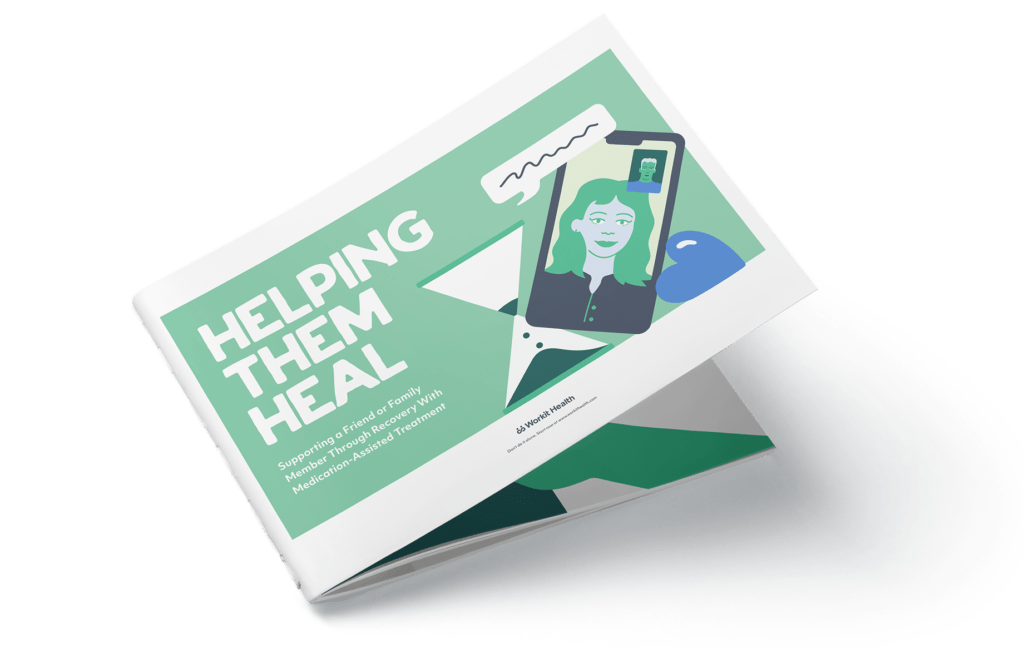Substance use disorder disproportionately impacts the LGBTQIA community who, as a population, already face a number of health disparities.
Workit Health’s supervising physician, Dr. Kevin Armington explains, “There are data showing that substance use disorder (SUD) and alcohol use disorder (AUD) are much more prevalent among these communities compared to the general public.”
Check out our recent guide, Mental Health and Recovery Resources for LGBTQIA People, for a more comprehensive insight into those health disparities and the stressors that this community faces. This article focuses specifically on the topic of chemsex, which is prevalent within the queer community (but not restricted to that community) and presents a number of risks and challenges.
What is chemsex?
Chemsex is the use of drugs to enhance one’s sex life in terms of duration and pleasure and to reduce inhibitions. The most common substances used during chemsex are stimulants like methamphetamine and mephedrone, and sedative-type drugs GHB and GBL. Chemsex is most commonly associated with sex among gay and bi men.
There are pronounced risks accompanying chemsex, such as the risk of overdose, complications from mixing substances, risks from intravenous drug use, and sexual health risks. It is possible, however, to reduce the harm associated with chemsex. We’ll delve into how and provide supportive resources.
What are the particular risks associated with chemsex?
The drugs associated with chemsex (GHB, methamphetamine, and mephedrone) alter consciousness in ways that range from loss of inhibition to more serious consequences, like coma. However, it’s difficult to be specific about the scope of harm from chemsex, says Dr. Armington. “We don’t really know how often chemsex causes serious harm to people who participate in it because there are not a lot of studies published.”
Anecdotally, however, it is common for medical providers to treat the effects of chemsex. “Any emergency medical provider or primary care provider who has patients who engage in chemsex can tell you that serious negative effects are not rare,” Dr. Armington says.
While studies are rare, there has been some research. A long-term study, called the German Chemsex Survey, surveyed 1,583 men who have sex with men about the mental health impact of chemsex. The results of the study, published in 2020, found that chemsex was associated with adverse mental health effects.
Dr. Armington reports, “Of those in the study who engaged in chemsex, the researchers found almost 50 percent of those who used reported that they lost control of how much they used, amount of time, and money spent while having sex. Over 13 percent reported psychotic symptoms and almost 3 percent engaged in physically aggressive behavior towards others.”
A further mental health impact associated with chemsex is the aftereffects commonly referred to as a “comedown.” These effects tend to be much worse than a typical ‘hangover.’ “After taking these drugs, especially for extended periods, people frequently experience very uncomfortable ‘coming down’ symptoms, such as body ache, headache, extreme fatigue, depression, anxiety,” Dr. Armington says.
Unfortunately, the effects are not limited to a comedown. The longer-term effects include depression, anxiety or some other mood disorder, and addiction. “Repeated use of drugs that stimulate the reward systems in the brain can result in addiction, sometimes very quickly,” explains Armington.
In terms of other risks, sexual health experts and advocates have identified the following risks associated with chemsex:
- Increased risk of acquiring an STI: Impaired judgment can cause someone to engage in behaviors that increase the risk of contracting syphilis, gonorrhea, chlamydia, HIV, or hepatitis C.
- Reduced inhibitions: Chemsex drugs are known to reduce inhibition, which often leads to lessened use of condoms, greater likelihood of sharing of drug equipment, and sex acts that carry greater risk.
- Forgetting to take PrEP: Either forgetting to take a dose of PrEp (post-exposure prophylaxis for HIV) or not getting medical care soon enough after exposure can dramatically increase the risk of acquiring HIV infection.
- Immediate catastrophic events: Stimulants like methamphetamines can cause significant health effects. They throw the cardiovascular system into overdrive, which can result in stroke or heart attack, aspiration pneumonia (passing out and inhaling stomach contents into airways, causing chemical burns and infection), overdose, and death.
- Impact on chronic illness: Chemsex can negatively impact chronic illnesses for which people take medication, like HIV, depression, asthma, high blood pressure, and diabetes. Missed doses of medication can take time to correct.
- Violent behavior: Chemsex drugs commonly cause paranoia, hallucinations, and distorted thinking. These behaviors can result in violence, sexual assault, robbery, and even death.
Any of these effects can and do happen to young, healthy people engaging in chemsex. Dr. Armington also points out, “These drugs increase stamina, so people tend to have more sex and for longer periods, thereby increasing their risk of exposures.”
How does chemsex impact SUD treatment and recovery?
People with substance use disorder, even if they are in recovery, often compare drugs and place different values on them. For example, we may think drugs like heroin are serious, whereas chemsex drugs are recreational and therefore less serious, and perhaps wouldn’t even affect their recovery. However, chemsex drugs can still set you on the road to returning to use, warns Dr. Armington.
“If you are in recovery from opioid or alcohol addiction, you might not consider drugs like GHB, crystal meth, or mephedrone to be a ‘slip’ or an infringement on your recovery. Remember, though, that these drugs will change your perspective once they enter your brain; so using heroin or drinking alcohol might not seem like such a big deal. Your defenses are down. This could start you back on the path to an addiction that you had worked hard to overcome.”
Perhaps the most important move after the use of chemsex is to be open about it with friends in recovery rather than lying or concealing information. It can be a burden to carry around secrets. The great thing about having experience of recovery is that if you have a slip, you already know what steps to take to get you back on track.
Harm reduction strategies for chemsex
Dr. Armington has given us plenty of helpful tips to reduce harm when engaging in chemsex:
- Get support from your medical provider. Tell your medical provider that you engage in chemsex. “Your medical provider wants to know and they can help you, even if you don’t intend to stop,” Dr. Armington says.
- Trust your people: Don’t party with people you don’t know or trust.
- Agree on what kinds of sex you will have before you take anything.
- Test your drugs beforehand to ensure they are not laced with fentanyl.
- Bring Narcan. Narcan can reverse the effects of an opioid overdose. While chemsex drugs don’t usually contain opioids, illicit substances are often cut with other drugs, like fentanyl (an opioid), which can be fatal. Additionally, if you are partying with others, you may not be aware of any other substances that they have taken. So it is always important to carry Narcan if you’ll be around drug use.
- Limit drugs. Buy only what you need to feel high, and make sure there is not enough available to cause an overdose.
- Be cautious. If you suspect that a drug you have taken was mixed with something unfamiliar, stop using it.
- Designate someone who agrees not to use or to use only small amounts so that they can take responsible action if needed to save a life
- Make a plan. Let someone else know what you are going to do and where you will be and agree to check in with each other at a certain time.
- PrEP. Set an alarm to remember to take PrEP, HIV medications if you are HIV positive, or other medications you take. If you have unprotected sex, write down when it occurred so that you can estimate if you need PrEP afterward. Have a dose of PrEP available.
- Plan ahead of time where and where you will seek medical care in case you need to start PrEP.
- Hydrate. Have plenty of water on hand and set reminders to drink it at regular intervals.
- Have food available.
- Ensure your phones are charged.
- Set a limit on how much time you will party, and do not party too often.
Chemsex resources
Last, here are some helpful resources to find out further information and support.
Websites:
- Avert: Global information about HIV and AIDS, prevention, testing, treatment, and more.
- Change, Grow, Love: A health and social care nonprofit that helps with drug use, alcohol, and other social issues. While this is a UK site, it has lots of relevant information for Americans
Clinics sensitive to the needs of people who participate in chemsex:
These brick-and-mortar clinics often include great resources on their websites for people who participate in chemsex.
- Gay Men’s Health Crisis: A nonprofit fighting to end the AIDS epidemic
- Callen Lorde Community Health Center: A global leader in LGBTQ healthcare
- Fenway Health: Advocates for equitable access to healthcare
- Howard Brown Health: Access to LGBTQ affirming healthcare






